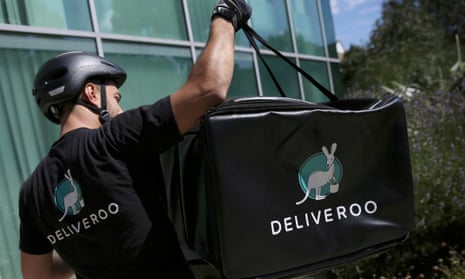Workers for the takeaway delivery firm Deliveroo have staged a sixth day of protests over a new pay deal, saying concessions only apply to those who are willing to work in new areas.
Last week, the firm, which sends couriers to restaurants including Pizza Express and Wagamama, told workers in some parts of London that it would be trialling a new pay structure. Instead of receiving £7 an hour and £1 for each delivery, under the new rules riders will receive a payment of £3.75 for each delivery.
Workers, who are self-employed and provide their own transport and insurance, said that they believed they would earn less under the changes and they were unhappy with the uncertainty it brought, while Labour condemned the move as a return to Victorian Britain.
Following complaints, the firm said it would underpin the new deal with guarantees for the first month, and allow workers who did not want to take part in the trial to work in different parts of London.
The Department for Business, Energy and Industrial Strategy stepped in on Sunday to say that workers must be paid the “national living wage” of £7.20 an hour unless a court or HMRC rules they are self-employed.
Deliveroo’s co-founder and chief executive, William Shu, told the BBC he was sorry that the protests, which began when workers in some parts of London were told they would move to the new payment structure, had escalated.
“I’m very sorry things have gone to this point. Our riders are the lifeblood of our business and without them we are nothing,” he told the Today programme.
He said the new pay plan was “in response to our riders’ number-one concern, which is flexibility … This was a choice for them. If the riders choose to be on a new scheme that’s great … If riders feel like it’s not for them, they can choose to work on the old scheme as well.”
Riders, however, said that to opt out they would have to move to a new delivery area, which could mean earning less money through the £1-a-delivery commission. Margaret Dewhurst from the Independent Workers Union of Great Britain (IWGB), said: “Riders have spent time building up their patch. They’ve been learning their areas for two or three years. “Changing zone will mean moving somewhere central which they don’t know, so they will end up doing fewer deliveries.”
A rider picketing outside the firm’s recruitment office in north London on Monday said that moving riders to zones outside the trial would mean “those zones are flooded so you will get fewer hours”.
David Scott, Deliveroo’s operations manager for the UK and Ireland, said he was confident that the new system was better for riders and confirmed the trial would be going ahead from Wednesday. He said workers would be able to log in whenever they wished for work, and in peak hours could earn more than with the hourly rate.
“They can choose to stay on the old rate in a nearby zone,” he said. “These areas are very small and very local … We are going to be supporting them if they want to move. The business is growing very fast so we won’t add in any more people than are needed.”
Scott said workers were having to sign up to new terms and conditions for the trial partly to show that they knew what they were moving onto, and that he was keen to hear feedback from riders. “A fee structure that doesn’t work for our riders will not work for Deliveroo,” he said. “We have an open door policy here. I have invited riders to come in and see us.”
A sign at the door of the office saying that drivers could only visit by appointment was “very much out-of-date” he said.
Asked what would happen after the 90-day trial, Scott said: “If they are not comfortable with continuing with the trial we will address that when we come to it.”
Amir Ali, who has been striking since last week, said the concessions were not enough, but he expected a further offer. “Now the government has got involved it’s on a different level,” he said.
Michael Boyle, a cyclist who works in central London, said that over lunchtime he had taken one order in four hours. “Under the new rules I would have earned just £3.75,” he said. “The flexibility is fantastic and I do still consider them a good employer, but this is such a drastic change … the company is outsourcing risk to us.”
The Green party leader, Natalie Bennett, said the government needed to do more to crack down on “dodgy employment practices”.
She said: “The new offer made by their employers still falls far below a living wage and fails to address the fact that riders’ employment contracts offer no security in the event of sickness or accidents.
“This strike highlights that while the ‘gig economy’ means cheaper and more convenient services for customers, it all too often relies on – and facilitates – the exploitation of workers.”
A fund for the striking workers had reached more than £8,000 on Monday afternoon.

Comments (…)
Sign in or create your Guardian account to join the discussion